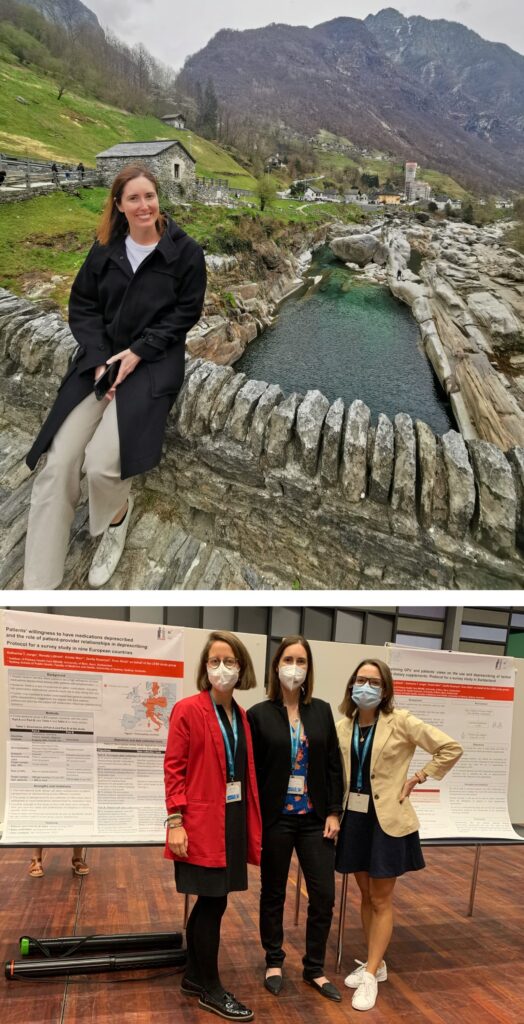Swiss Government
Excellence Scholarship
Promoting international exchange and research cooperation between Switzerland and over 180 other countries.
Swiss Government Excellence Scholarships
Each year the Swiss Confederation awards Government Excellence Scholarships to promote international exchange and research cooperation between Switzerland and over 180 other countries. Recipients are selected by the awarding body, the Federal Commission for Scholarships for Foreign Students (FCS).
The Swiss Government Excellence Scholarships are aimed at young researchers from abroad who have completed a master’s degree or PhD and at foreign artists holding a bachelor’s degree.
Applications for the 2024 programme are now open.
For all inquiries, contact: canberra.scholarships@eda.admin.ch
Hear from past Swiss Government Excellence Scholars.

Hydrogen fuel research in Switzerland: a catalyst for new opportunities
Constantine Tsounis
“My scholarship to pursue research at ETH Zurich in Switzerland gave me access to world-leading sustainability expertise, and I found a new material to make hydrogen as a renewable fuel,” said Constantine (Con) Tsounis.
As a chemical engineer and founder of a clean energy start-up company, Con already had experience in generating hydrogen from water – this ‘green’ hydrogen is suitable as an energy carrier, fuel, or industrial feedstock for chemicals like ammonia.
But a new capability emerged when he spent eight months working in a Swiss lab developing metal oxides which are used to produce hydrogen.
“In Australia, I used carbon-based catalysts to produce hydrogen from water,” Con said. “As a Swiss Government Excellence Scholar at ETH Zurich, I developed a new kind of catalyst – one made from a metal oxide called perovskite.”
Con tweaked the chemical properties of the perovskite to make the production of hydrogen more efficient.
“This work became the last chapter of my PhD thesis,” said Con. “It may lead to new, large-scale technologies for producing hydrogen as a sustainable energy source.”
Con plans to work in sustainability and financial services.

Addressing the needs of people with dementia: how robotic pets and other digital assistive technologies can improve care
Rasita Vinay
The number of Australians with dementia will more than double by 2058, due to the country’s growing and ageing population. Researchers around the world are working to maintain the health and quality of life of people with this condition for as long as possible.
Rasita Vinay, a bioethicist and a Swiss Excellence PhD Scholar at the University of Zurich, aimed to present and analyse the current challenges and ethical discussions surrounding dementia care currently, based on international public health policies.
From her findings, Rasita explored the advancements in technology and how they can be used to promote better caregiving and help ease certain behavioural and psychological symptoms of dementia.
“Digital assistive technologies can definitely be useful in the care we offer people with dementia,” says Rasita.
Robotic pets such as PARO (a robotic seal) are an example of a digital assistive technology. Robotic pets are small, animal-like machines that interact with people but don’t require feeding, exercise, or clean-ups like living dogs or cats.
“They’re perfect for dementia patients,” Rasita says.
Having completed a Masters in Bioethics at Monash University, Rasita says moving to Switzerland widened the scope of her research considerably.
“On a global scale, Australia ranks highly in how we care for people with dementia,” she explains. “However, in Australia I felt more limited to philosophical concepts, whereas bioethics research in Switzerland is much more direct, which means we can take concepts and theories and apply them to real life.”
In addition to exploring digitalisation in dementia care, Rasita’s PhD research recommends ethical frameworks and guidelines on aspects of dementia care for individual countries to tailor according to their own demographic and economic characteristics.
“Future research can help fill the gaps in how to improve the care provided to people with dementia,” Rasita says. “Through my work, I hope to contribute to such advancements in research.”

Reducing medication – Swiss scholarship elevates Kristie’s study
Kristie Weir
Dr Kristie Weir wants to address the problems of polypharmacy – the simultaneous use of multiple medicines – to improve the lives of seniors in Australia, Switzerland, and beyond.
“A high proportion of older people in Australia, Switzerland and many other countries take five or even more medicines daily,” says Kristie. “That brings some risks, and so my work explores how to safely lower unnecessary or inappropriate medication.”
As a Swiss Government Excellence scholar at the Institute of Primary Health Care (BIHAM), University of Bern, Kristie worked on large, collaborative studies which would not have been possible from Australia.
“My Australian work looked at how older adults differ in their attitudes towards medicines, their willingness to reduce medication and how they make decisions,” Kristie says. “In Switzerland I was able to apply that framework to collect data for a survey study in a 14-countries in Europe and Israel.”
Kristie, a research fellow at the University of Sydney, School of Public Health, Faculty of Medicine and Health, has been awarded an NHMRC Investigator Grant (Emerging Leader) and is translating her findings into healthcare practise through ongoing clinical trial research with Swiss collaborators.
“The scholarship made a big difference to how competitive I was in gaining new research funding,” says Kristie. “The programme has done wonders for my career, for my track record and for my growth as a researcher.”
“My time in Switzerland has shown importance of international collaborations in research,” Kristie says.
See other programmes on Head Start Swiss.